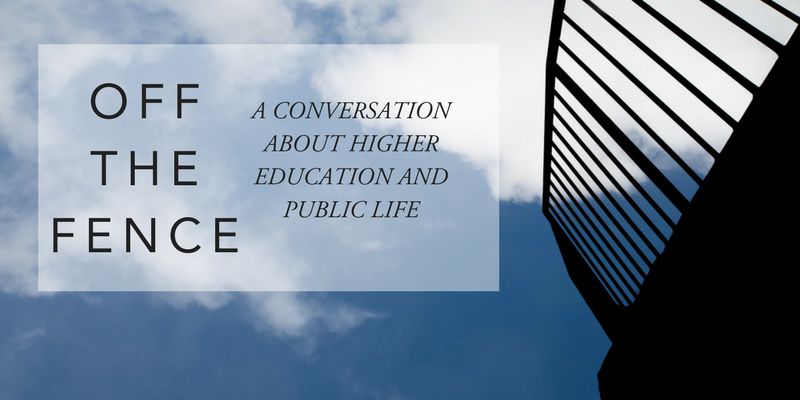Off the Fence

Universities are institutions which will ideally address difficult social issues. Places of higher learning are not neutral: those of us who work in them pursue specific priorities. In broad terms, our work accepts social relations as they are, and thus contributes to maintaining these social relations; or in some way challenges current social practices. In this sense, university administrators and faculty members routinely engage ethical and social questions. We cannot escape the reality that our professional choices and pursuits have public significance and are consequential. Thus, this series of essays is called ‘Off the Fence’: an acknowledgement that none of us have the option of remaining neutral. Our work is necessarily implicated in the push and pull of social relations.
My own intellectual work has valued analysis and dialogue that begin with issues to which I and those with whom I interact have a direct connection, especially as related to where we live and work, and to professional and community ties. The primary objective of this page is to engage issues of public importance in ways that encourage dialogue among multiple stakeholders. I am interested in naming practices of inequity, and imagining possibilities for moving toward justice. Ideally, the essays posted on this page will invite a variety of individuals and organizations to carefully consider their connection to practices of injustice, and to publicly engage conversations about and steps toward equity.
Anti-Colonialism and Support for Indigenous Students at MUN
Over the past few weeks, there has been considerable public discussion in Labrador related to issues of importance for the NunatuKavut Community Council and the Innu Nation. This discussion, and the concerns that individuals and communities are addressing, are relevant to those of us who work at Memorial University. Issues that matter for Indigenous and Innu communities in Labrador potentially affect students, staff, and faculty, some of whom are from Labrador. These issues also matter to the province. In this particular situation in Labrador, part of what is under discussion is Indigenous self-identification, which has a direct link to self-determination for Indigenous communities.
Questions of self-identification and self-determination for any Indigenous community, including those in Labrador, are complex. As I have noted in my role as Dean, the Faculty of Humanities and Social Sciences (HSS) is in part directed toward thinking about and reflecting on what it means to live together well. As noted in my introduction to “Off the Fence” essays, our work is necessarily implicated in the push and pull of social relations. Memorial University’s land acknowledgement also points to the importance of faculty, staff, and students at Memorial University engaging in ethical relationships. In regard to the ongoing discussion in Labrador involving the NunatuKavut Community Council and the Innu Nation, then, it is worth asking how HSS faculty members and staff can support, at a minimum, Indigenous students at Memorial.
Four starting points that lead to support for Indigenous students, staff, and faculty at Memorial are:
- Recognizing that disagreement between and amongst Indigenous communities occurs within ongoing practices of colonialism. Colonialism, which includes forms of oppression and discrimination against Indigenous communities, does harm. It affects individuals and communities in lasting ways. It nearly always ensures that the affected communities receive substandard services and fewer resources than white and settler communities. Colonialism can and does contribute to tensions between and amongst Indigenous communities.
- Keeping in mind that self-identification is an important component of self-determination. Self-identification, for individuals and within Indigenous communities, is complicated. At the same time, self-identification is ultimately a process for which Indigenous individuals and communities are responsible.
- Ensuring that Indigenous students (and staff and faculty members) at Memorial feel supported is everyone’s responsibility, including faculty members in HSS. Providing support to Indigenous students, staff, and faculty can be difficult and is necessary. It can help to acknowledge: the variety of experiences, histories, and interests of various Indigenous communities; the existence of ongoing and structural forms of colonialism in Canada; that colonialism matters for everyone living in Canada; and that while Indigenous students will have an experience of being Indigenous, it is not their responsibility to, in the classroom or any other setting, educate others at Memorial about colonialism and/or their community.
- Committing to learning about realities for Indigenous communities in Newfoundland and Labrador. There are multiple options for learning about issues that are important to the NunatuKavut Community Council, the Innu Nation, and other Indigenous communities in the province. A couple of those options include: a FAQ posted by the NunatuKavut Community Council and a primer on Indigenous Peoples and protocols in Newfoundland and Labrador (posted on MUN’s Office of Research website).
Ideally, universities, and particularly humanities and social science scholars, will take up difficult public issues. We will consider the ways in which we are implicated in social relations, and how we can contribute to practices of equity within a history and ongoing reality of colonialism.